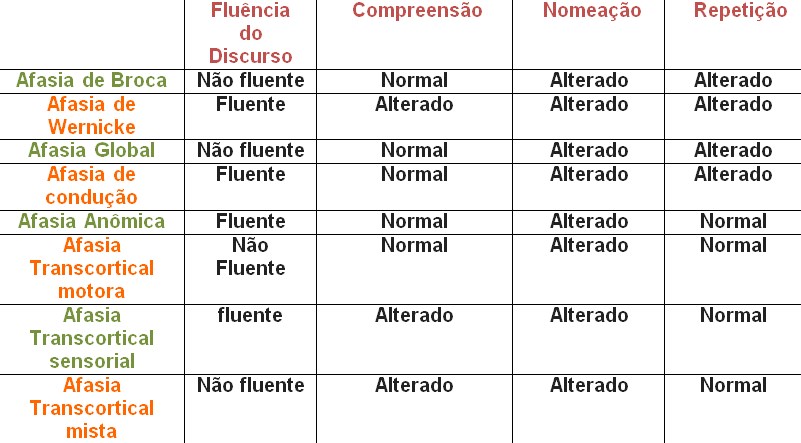Quanto tempo dura a afasia?

Is aphasia life long
In some cases, aphasia is a short-term problem and will go away quickly. For others, it might take weeks or even months for you to recover fully. Unfortunately, aphasia that happens because of permanent brain damage is often a life-long problem.
What is mild aphasia of speech
Mild aphasia means the person experiences difficulty communicating less than 25% of the time. It may not be obvious to everyone they speak with. Here's a guide for helping people with severe aphasia or global aphasia. Severe aphasia means the message is conveyed less than 50% of the time.
What is fluent aphasia in the brain
Wernicke's aphasia (fluent aphasia)
Wernicke's aphasia or receptive aphasia is when someone is able to speak well and use long sentences, but what they say may not make sense. They may not know that what they're saying is wrong, so may get frustrated when people don't understand them.
Can a person recover from aphasia
Some people with aphasia recover completely without treatment. But for most people, some amount of aphasia typically remains. Treatments such as speech therapy can often help recover some speech and language functions over time, but many people continue to have problems communicating.
Does aphasia get worse with age
Symptoms begin gradually, often before age 65. They get worse over time. People with primary progressive aphasia can lose the ability to speak and write.
Can you have aphasia without having a stroke
Aphasia usually happens suddenly after a stroke or a head injury. But it can also come on gradually from a slow-growing brain tumor or a disease that causes progressive, permanent damage (degenerative). The severity of aphasia depends on a number of things, including the cause and the extent of the brain damage.
Is aphasia brain damage
Aphasia is a disorder that results from damage to portions of the brain that are responsible for language. For most people, these areas are on the left side of the brain.
Can you live a full life with aphasia
For some patients, it can even go away completely—like it reportedly did after about a week for Game of Thrones star Emilia Clarke, who developed the disorder after having a brain aneurysm. In other cases, however, patients will continue to cope with symptoms for the rest of their lives.
How fast does aphasia progress
People with primary progressive aphasia eventually lose the ability to speak and write. This may take anywhere from 3 to 15 years. They also have trouble understanding written and spoken language. Some people are not able to form sounds to speak, even when they still have the ability to write and comprehend language.
What are the final stages of aphasia
heavily reduced or unintelligible speech. difficulty understanding other people (both with spoken and written information) increased difficulty making complex decisions (around finances and money, for example) difficulty with judgment, planning and concentration, affecting activities such as driving.
What is the most common reason for aphasia
What causes aphasia Aphasia is caused by damage to one or more of the language areas of the brain. Most often, the cause of the brain injury is a stroke. A stroke occurs when a blood clot or a leaking or burst vessel cuts off blood flow to part of the brain.
How does a person get aphasia
Aphasia usually happens suddenly after a stroke or a head injury. But it can also come on gradually from a slow-growing brain tumor or a disease that causes progressive, permanent damage (degenerative). The severity of aphasia depends on a number of things, including the cause and the extent of the brain damage.
Does aphasia get worse over time
As it's a progressive condition, the symptoms get worse over time. Usually, the first problem people with primary progressive aphasia (PPA) notice is difficulty finding the right word or remembering somebody's name.


